英语中考备考关键——重点词汇辨析、
- 格式:doc
- 大小:91.00 KB
- 文档页数:13
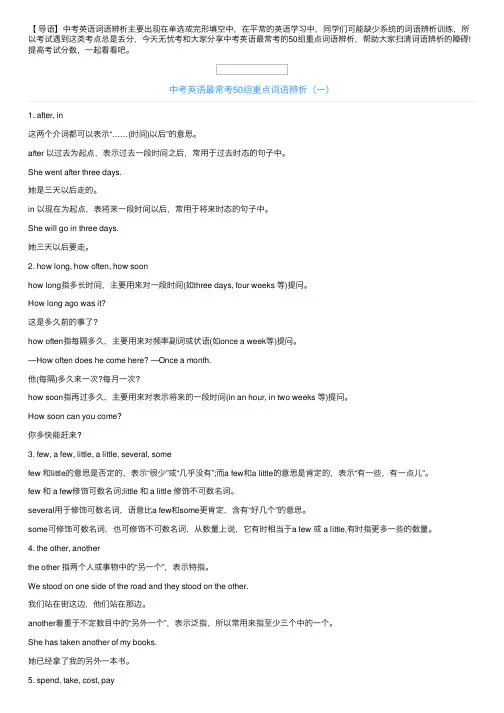
【导语】中考英语词语辨析主要出现在单选或完形填空中,在平常的英语学习中,同学们可能缺少系统的词语辨析训练,所以考试遇到这类考点总是丢分,今天⽆忧考和⼤家分享中考英语最常考的50组重点词语辨析,帮助⼤家扫清词语辨析的障碍!提⾼考试分数,⼀起看看吧。
中考英语最常考50组重点词语辨析(⼀)1. after, in这两个介词都可以表⽰“……(时间)以后”的意思。
after 以过去为起点,表⽰过去⼀段时间之后,常⽤于过去时态的句⼦中。
She went after three days.她是三天以后⾛的。
in 以现在为起点,表将来⼀段时间以后,常⽤于将来时态的句⼦中。
She will go in three days.她三天以后要⾛。
2. how long, how often, how soonhow long指多长时间,主要⽤来对⼀段时间(如three days, four weeks 等)提问。
How long ago was it?这是多久前的事了?how often指每隔多久,主要⽤来对频率副词或状语(如once a week等)提问。
—How often does he come here? —Once a month.他(每隔)多久来⼀次?每⽉⼀次?how soon指再过多久,主要⽤来对表⽰将来的⼀段时间(in an hour, in two weeks 等)提问。
How soon can you come?你多快能赶来?3. few, a few, little, a little, several, somefew 和little的意思是否定的,表⽰“很少”或“⼏乎没有”;⽽a few和a little的意思是肯定的,表⽰“有⼀些,有⼀点⼉”。
few 和 a few修饰可数名词;little 和 a little 修饰不可数名词。
several⽤于修饰可数名词,语意⽐a few和some更肯定,含有“好⼏个”的意思。
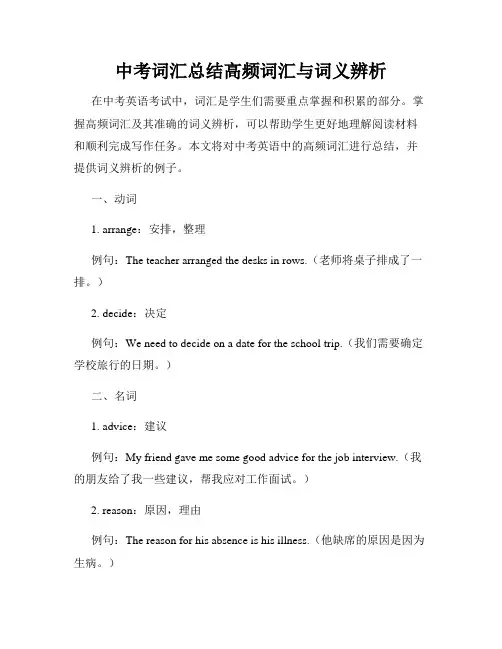
中考词汇总结高频词汇与词义辨析在中考英语考试中,词汇是学生们需要重点掌握和积累的部分。
掌握高频词汇及其准确的词义辨析,可以帮助学生更好地理解阅读材料和顺利完成写作任务。
本文将对中考英语中的高频词汇进行总结,并提供词义辨析的例子。
一、动词1. arrange:安排,整理例句:The teacher arranged the desks in rows.(老师将桌子排成了一排。
)2. decide:决定例句:We need to decide on a date for the school trip.(我们需要确定学校旅行的日期。
)二、名词1. advice:建议例句:My friend gave me some good advice for the job interview.(我的朋友给了我一些建议,帮我应对工作面试。
)2. reason:原因,理由例句:The reason for his absence is his illness.(他缺席的原因是因为生病。
)三、形容词1. polite:有礼貌的例句:Emily is always polite to her elders.(艾米莉对长辈总是非常有礼貌。
)2. honest:诚实的例句:He is an honest person and never tells lies.(他是一个诚实的人,从不说谎。
)四、副词1. quickly:快速地例句:She finished the race quickly and won the first place.(她迅速完成了比赛并获得了第一名。
)2. quietly:安静地例句:Please read quietly in the library.(请在图书馆安静地阅读。
)词义辨析:1. forget与remember虽然forget和remember都有“记住”的意思,但用法上有所不同。
forget表示“忘记”,后接名词或动名词,而remember表示“记得”,后接名词、动名词、动词-ing形式或从句。
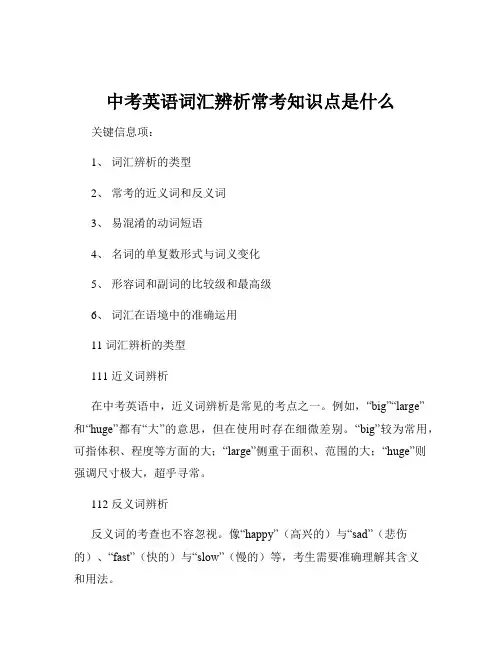
中考英语词汇辨析常考知识点是什么关键信息项:1、词汇辨析的类型2、常考的近义词和反义词3、易混淆的动词短语4、名词的单复数形式与词义变化5、形容词和副词的比较级和最高级6、词汇在语境中的准确运用11 词汇辨析的类型111 近义词辨析在中考英语中,近义词辨析是常见的考点之一。
例如,“big”“large”和“huge”都有“大”的意思,但在使用时存在细微差别。
“big”较为常用,可指体积、程度等方面的大;“large”侧重于面积、范围的大;“huge”则强调尺寸极大,超乎寻常。
112 反义词辨析反义词的考查也不容忽视。
像“happy”(高兴的)与“sad”(悲伤的)、“fast”(快的)与“slow”(慢的)等,考生需要准确理解其含义和用法。
113 形似词辨析一些词汇在拼写和发音上相似,但词义完全不同。
如“quite”(相当)和“quiet”(安静的),“accept”(接受)和“except”(除之外)。
12 常考的近义词和反义词121 常见的近义词“look”“see”“watch”都与“看”有关,但“look”强调看的动作,“see”侧重于看的结果,“watch”则常指观看活动、比赛等。
“spend”“cost”“take”“pay”都有“花费”之意,“spend”主语是人,“cost”主语是物,“take”通常用于“it takes sb some time to do sth”句型,“pay”常与“for”搭配。
122 常见的反义词“good”与“bad”、“right”与“wrong”、“many”与“few”、“much”与“little”等反义词在中考中经常出现,需要考生清晰掌握其用法和区别。
13 易混淆的动词短语131 由“put”构成的动词短语“put on”(穿上)、“put off”(推迟)、“put up”(张贴;举起)、“put away”(收拾好)等,这些短语的含义和用法各不相同。
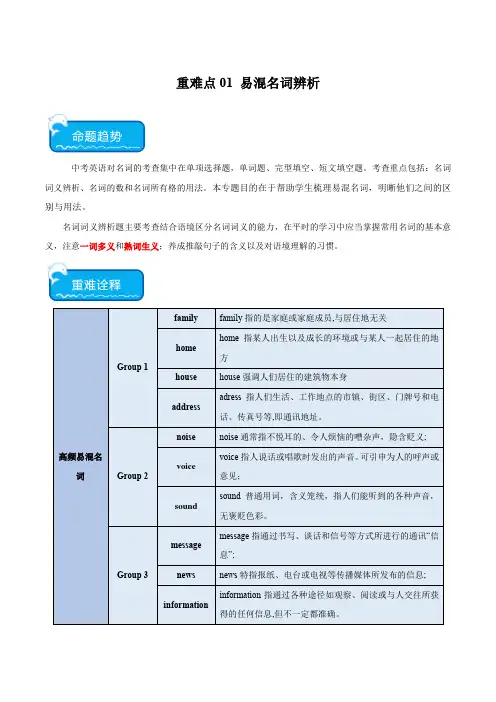
重难点01 易混名词辨析中考英语对名词的考查集中在单项选择题,单词题、完型填空、短文填空题。
考查重点包括:名词词义辨析、名词的数和名词所有格的用法。
本专题目的在于帮助学生梳理易混名词,明晰他们之间的区别与用法。
名词词义辨析题主要考查结合语境区分名词词义的能力,在平时的学习中应当掌握常用名词的基本意义,注意一词多义和熟词生义;养成推敲句子的含义以及对语境理解的习惯。
(2023中考真题建议用时:15分钟)1.(2023·辽宁鞍山·中考真题)—Why does Mary get good grades each time?—I think that’s because she puts most of her ________ into her schoolwork.A.energy B.practice C.exercise D.process2.(2023·内蒙古·中考真题)—The model plane is wonderful! How did you make it?—It’s easy. Follow the ________ and you can do it, too.A.discussion B.education C.conditions D.instructions3.(2023·江苏淮安·中考真题)As a student, you should keep a ________ between your schoolwork and yourhobbies.A.diary B.record C.secret D.balance4.(2023·湖北襄阳·中考真题)—Mr. Fan runs at least half an hour every day.—What a good ________! No wonder he looks healthy.A.habit B.question C.article D.prediction5.(2023·湖北黄石·中考真题)—Could you tell me the ________ of making such tasty dumplings?—Well, I just follow the steps on Tiktok.A.cost B.method C.time D.menu6.(2023·内蒙古呼和浩特·中考真题)High-speed trains are seen as one of the new Four Great ________ of China.A.Inventions B.Advantages C.Environments D.Technologies7.(2023·江苏常州·中考真题)After she was brought back to China, the sick giant panda Ya Ya received good ________ in her new home and got better.A.education B.communication C.entertainment D.treatment8.(2023·江苏南通·中考真题)—________ are easily made, but not easily kept.—That’s true. Once you make one, be sure to keep it.A.Speeches B.Decisions C.Promises D.Suggestions9.(2023·江苏镇江·中考真题)The main ________ of the cities along the Grand Canal (大运河) is history and culture.A.attraction B.pollution C.invention D.situation10.(2023·青海·中考真题)A taxi driver prevented (阻止) an _________ when he saw a car with serious problems travelling across Huangnan.A.accident B.interview C.advertisement11.(2023·山东青岛·中考真题)Before flying a plane, a ________ must take a lot of training.A.policeman B.musician C.nurse D.pilot12.(2023·湖北十堰·中考真题)—How did you fix up the machine, dad?—It’s easy. I just followed the ________.A.instructions B.inventions C.interviews D.influences13.(2023·江苏徐州·中考真题)Of all the ________, I love summer best.A.seasons B.subjects C.colours D.hobbies14.(2023·辽宁丹东·中考真题)Mary’s parents are interested in ________, so they often take her to concerts.A.sports B.music C.science D.movies15.(2023·江苏宿迁·中考真题)—The girl’s beautiful pronunciation caught our ________ in yesterday’s English speech competition.—Yes, many students couldn’t help cheering for her.A.condition B.attention C.invention D.position16.(2023·江苏泰州·中考真题)—Good news! The Chinese women table tennis team won a gold and a silver again.—Great! No matter who wins the medals, it is the ________ of our country.A.price B.pioneer C.pride D.pain17.(2023·黑龙江牡丹江·中考真题)Although our school life is a little busy, it is full of ________.A.pain B.sadness C.laughter18.(2023·四川遂宁·中考真题)—Which movie would you like to watch, Tracy?— Um…it’s hard to make a ________.A.survey B.choice C.call D.wish19.(2023·辽宁·中考真题)Thanks to the teacher’s help, I solved all the ________ easily.A.chances B.problems C.habits D.grades20.(2023·辽宁营口·中考真题)Scientists who are full of ________ always come up with new ideas and bring great changes to our life.A.instruction B.instrument C.invention D.introduction1.A【详解】句意:——为什么玛丽每次都取得好成绩?——我想那是因为她把大部分精力都放在功课上了。
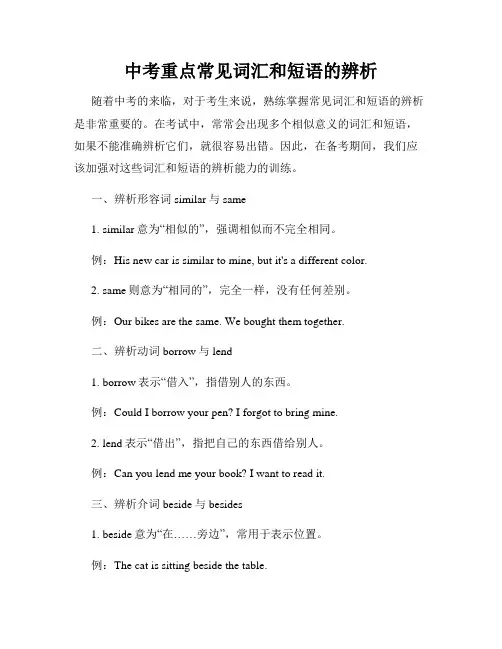
中考重点常见词汇和短语的辨析随着中考的来临,对于考生来说,熟练掌握常见词汇和短语的辨析是非常重要的。
在考试中,常常会出现多个相似意义的词汇和短语,如果不能准确辨析它们,就很容易出错。
因此,在备考期间,我们应该加强对这些词汇和短语的辨析能力的训练。
一、辨析形容词similar与same1. similar意为“相似的”,强调相似而不完全相同。
例:His new car is similar to mine, but it's a different color.2. same则意为“相同的”,完全一样,没有任何差别。
例:Our bikes are the same. We bought them together.二、辨析动词borrow与lend1. borrow表示“借入”,指借别人的东西。
例:Could I borrow your pen? I forgot to bring mine.2. lend表示“借出”,指把自己的东西借给别人。
例:Can you lend me your book? I want to read it.三、辨析介词beside与besides1. beside意为“在……旁边”,常用于表示位置。
例:The cat is sitting beside the table.2. besides意为“除了……之外”,常用于表示除了某事物或某人之外还有其他的事物或人。
例:Besides apples, we also have oranges.四、辨析动词learn与teach1. learn表示“学习”,指通过努力和训练获取新的知识或技能。
例:I learn English every day.2. teach表示“教”,指教授知识或技能给他人。
例:She teaches us math every Monday.五、辨析连词unless与if1. unless意为“除非”,相当于if not。
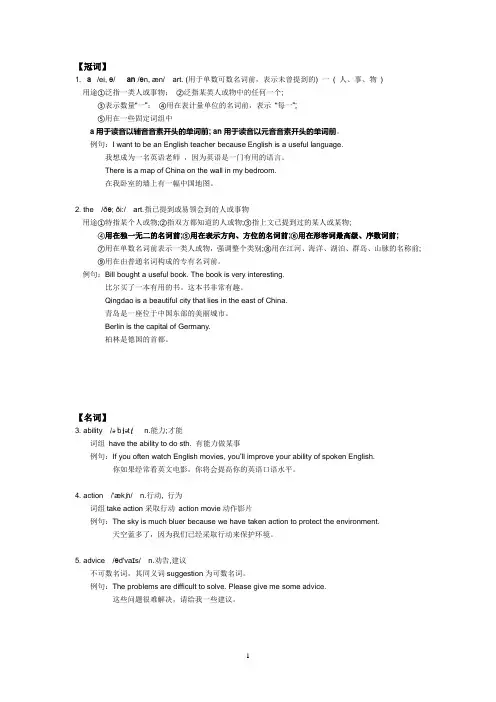
【冠词】1. a /ei, ə/ an /ən, æn/art. (用于单数可数名词前,表示未曾提到的) 一( 人、事、物)用途①泛指一类人或事物;②泛指某类人或物中的任何一个;③表示数量“一”;④用在表计量单位的名词前,表示“每一”;⑤用在一些固定词组中a用于读音以辅音音素开头的单词前; an用于读音以元音音素开头的单词前。
例句:I want to be an English teacher because English is a useful language.我想成为一名英语老师,因为英语是一门有用的语言。
There is a map of China on the wall in my bedroom.在我卧室的墙上有一幅中国地图。
2. the /ðə; ði:/ art.指已提到或易领会到的人或事物用途①特指某个人或物;②指双方都知道的人或物;③指上文已提到过的某人或某物;④用在独一无二的名词前;⑤用在表示方向、方位的名词前;⑥用在形容词最高级、序数词前;⑦用在单数名词前表示一类人或物,强调整个类别;⑧用在江河、海洋、湖泊、群岛、山脉的名称前;⑨用在由普通名词构成的专有名词前。
例句:Bill bought a useful book. The book is very interesting.比尔买了一本有用的书。
这本书非常有趣。
Qingdao is a beautiful city that lies in the east of China.青岛是一座位于中国东部的美丽城市。
Berlin is the capital of Germany.柏林是德国的首都。
【名词】3. ability /əˈbɪlətɪ/ n.能力;才能词组have the ability to do sth. 有能力做某事例句:If you often watch English movies, you’ll improve your ability of spoken English.你如果经常看英文电影,你将会提高你的英语口语水平。
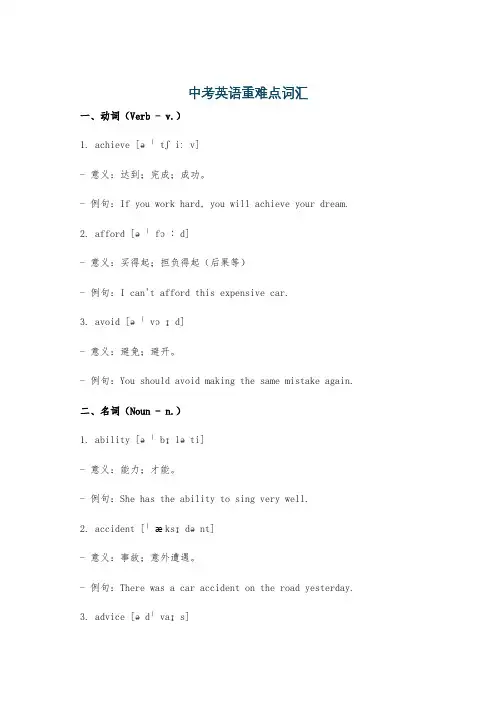
中考英语重难点词汇一、动词(Verb - v.)1. achieve [əˈtʃiːv]- 意义:达到;完成;成功。
- 例句:If you work hard, you will achieve your dream.2. afford [əˈfɔːd]- 意义:买得起;担负得起(后果等)- 例句:I can't afford this expensive car.3. avoid [əˈvɔɪd]- 意义:避免;避开。
- 例句:You should avoid making the same mistake again.二、名词(Noun - n.)1. ability [əˈbɪləti]- 意义:能力;才能。
- 例句:She has the ability to sing very well.2. accident [ˈæksɪdənt]- 意义:事故;意外遭遇。
- 例句:There was a car accident on the road yesterday.3. advice [ədˈvaɪs]- 意义:劝告;建议(不可数名词)- 例句:Can you give me some advice on how to learn English?三、形容词(Adjective - adj.)1. active [ˈæktɪv]- 意义:活跃的;积极的。
- 例句:He is an active boy in class.2. afraid [əˈfreɪd]- 意义:害怕的;担心的。
- 例句:She is afraid of dogs.3. amazing [əˈmeɪzɪŋ]- 意义:令人大为惊奇的;令人惊喜(惊叹)的。
- 例句:The magic show was really amazing.。
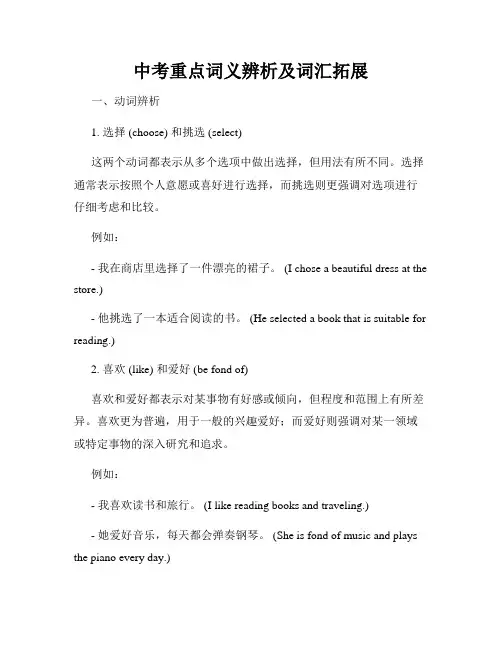
中考重点词义辨析及词汇拓展一、动词辨析1. 选择 (choose) 和挑选 (select)这两个动词都表示从多个选项中做出选择,但用法有所不同。
选择通常表示按照个人意愿或喜好进行选择,而挑选则更强调对选项进行仔细考虑和比较。
例如:- 我在商店里选择了一件漂亮的裙子。
(I chose a beautiful dress at the store.)- 他挑选了一本适合阅读的书。
(He selected a book that is suitable for reading.)2. 喜欢 (like) 和爱好 (be fond of)喜欢和爱好都表示对某事物有好感或倾向,但程度和范围上有所差异。
喜欢更为普遍,用于一般的兴趣爱好;而爱好则强调对某一领域或特定事物的深入研究和追求。
例如:- 我喜欢读书和旅行。
(I like reading books and traveling.)- 她爱好音乐,每天都会弹奏钢琴。
(She is fond of music and plays the piano every day.)3. 认为 (think) 和相信 (believe)认为和相信都表示个人的观点或信念,但有所区别。
认为多指基于观察、推理或经验的主观判断,而相信则强调对某一观点或信仰的坚定信心。
例如:- 我认为这个问题很复杂。
(I think this problem is complex.)- 她相信努力就会有好结果。
(She believes that hard work leads to good results.)二、名词辨析1. 图画 (picture) 和照片 (photo)图画和照片都指呈现出来的图像,但用法和形式上有所差异。
图画通常指手绘或绘画作品,而照片则指由相机拍摄得到的影像。
例如:- 这幅图画很美丽,充满了艺术感。
(This picture is beautiful and full of artistic sense.)- 我们合影了一张照片来留念。
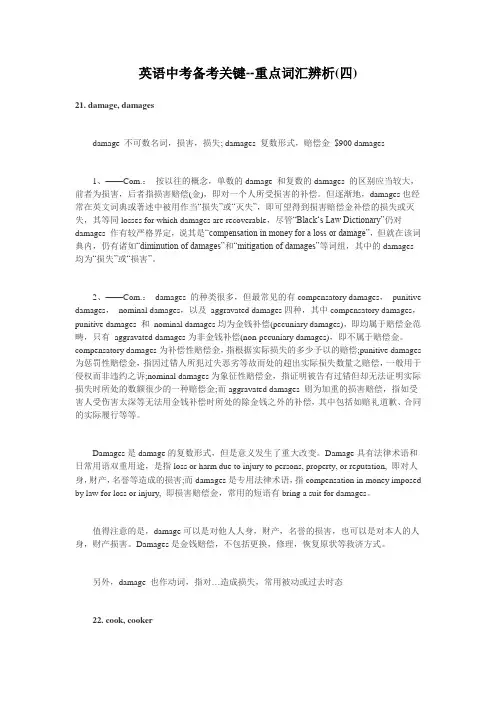
英语中考备考关键--重点词汇辨析(四)21. damage, damagesdamage 不可数名词,损害,损失; damages 复数形式,赔偿金$900 damages1、——Com.:按以往的概念,单数的damage 和复数的damages 的区别应当较大,前者为损害,后者指损害赔偿(金),即对一个人所受损害的补偿。
但逐渐地,damages也经常在英文词典或著述中被用作当“损失”或“灭失”,即可望得到损害赔偿金补偿的损失或灭失,其等同losses for which damages are recoverable,尽管“Black…s Law Dictionary”仍对damages 作有较严格界定,说其是“compensation in money for a loss or damage”,但就在该词典内,仍有诸如“diminution of damages”和“mitigation of damages”等词组,其中的damages均为“损失”或“损害”。
2、——Com.:damages 的种类很多,但最常见的有compensatory damages,punitive damages,nominal damages,以及aggravated damages四种,其中compensatory damages,punitive damages 和nominal damages均为金钱补偿(pecuniary damages),即均属于赔偿金范畴,只有aggravated damages为非金钱补偿(non-pecuniary damages),即不属于赔偿金。
compensatory damages为补偿性赔偿金,指根据实际损失的多少予以的赔偿;punitive damages 为惩罚性赔偿金,指因过错人所犯过失恶劣等故而处的超出实际损失数量之赔偿,一般用于侵权而非违约之诉;nominal damages为象征性赔偿金,指证明被告有过错但却无法证明实际损失时所处的数额很少的一种赔偿金;而aggravated damages 则为加重的损害赔偿,指如受害人受伤害太深等无法用金钱补偿时所处的除金钱之外的补偿,其中包括如赔礼道歉、合同的实际履行等等。
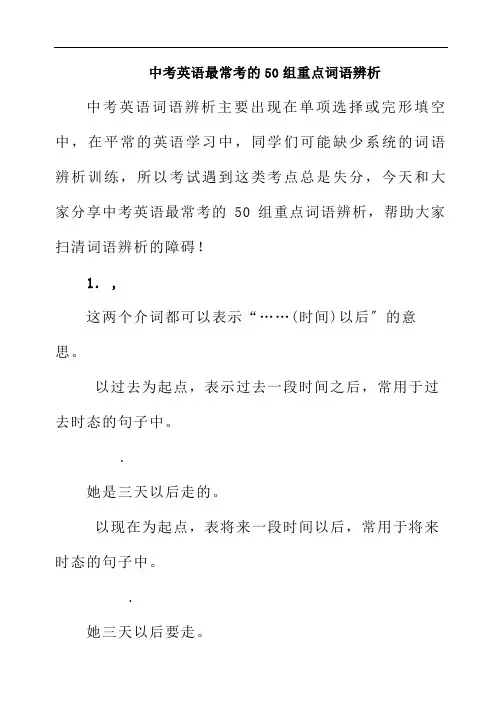
中考英语最常考的50组重点词语辨析中考英语词语辨析主要出现在单项选择或完形填空中,在平常的英语学习中,同学们可能缺少系统的词语辨析训练,所以考试遇到这类考点总是失分,今天和大家分享中考英语最常考的50组重点词语辨析,帮助大家扫清词语辨析的障碍!1. ,这两个介词都可以表示“……(时间)以后〞的意思。
以过去为起点,表示过去一段时间之后,常用于过去时态的句子中。
.她是三天以后走的。
以现在为起点,表将来一段时间以后,常用于将来时态的句子中。
.她三天以后要走。
2. , ,指多长时间,主要用来对一段时间(如 , 等)提问。
?这是多久前的事了?指每隔多久,主要用来对频率副词或状语(如 a 等)提问。
— ? — a .他(每隔)多久来一次?每月一次?指再过多久,主要用来对表示将来的一段时间( , 等)提问。
?你多快能赶来?3. , a , , a , ,和的意思是否认的,表示“很少〞或“几乎没有〞;而a 和a 的意思是肯定的,表示“有一些,有一点儿〞。
和 a 修饰可数名词和 a 修饰不可数名词。
用于修饰可数名词,语意比a 和更肯定,含有“好几个〞的意思。
可修饰可数名词,也可修饰不可数名词,从数量上说,它有时相当于a 或 a ,有时指更多一些的数量。
4. ,指两个人或事物中的“另一个〞,表示特指。
.我们站在街这边,他们站在那边。
着重于不定数目中的“另外一个〞,表示泛指,所以常用来指至少三个中的一个。
.她已经拿了我的另外一本书。
5. , , ,的宾语通常是时间,金钱,在主动语态中,句子的主语必须是人,而且后面不能用动词不定式做它的宾语。
.她把整个晚上用来读书。
常常用来指“花费〞时间,句子的主语通常是表示事物的词语。
?你做这项工作要花多长时间?指花费时间、金钱或力气等,只能用表示事物的词做主语,并且不能用于被动语态。
?这件夹克多少钱?主要指主语(某人)买某物(或为某事)付多少钱(给某人)。
I .我按月支付租金。
6. , , ,这四个动词都有“说〞的意思。
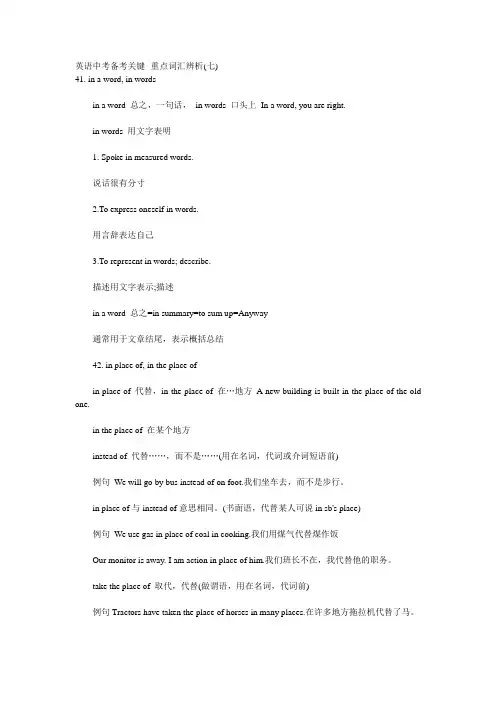
英语中考备考关键--重点词汇辨析(七)41. in a word, in wordsin a word 总之,一句话,in words 口头上In a word, you are right.in words 用文字表明1. Spoke in measured words.说话很有分寸2.To express oneself in words.用言辞表达自己3.To represent in words; describe.描述用文字表示;描述in a word 总之=in summary=to sum up=Anyway通常用于文章结尾,表示概括总结42. in place of, in the place ofin place of 代替,in the place of 在…地方A new building is built in the place of the old one.in the place of 在某个地方instead of 代替……,而不是……(用在名词,代词或介词短语前)例句We will go by bus instead of on foot.我们坐车去,而不是步行。
in place of与instead of意思相同。
(书面语,代替某人可说in sb's place)例句We use gas in place of coal in cooking.我们用煤气代替煤作饭Our monitor is away. I am action in place of him.我们班长不在,我代替他的职务。
take the place of 取代,代替(做谓语,用在名词,代词前)例句Tractors have taken the place of horses in many places.在许多地方拖拉机代替了马。
in place of :代替的意思eg. I will go to this meeting in place of you.我会代替你去参加这次会议。
中考英语重点词汇辨析1.a bit/ a little(1)这两个词都意为“一点儿”有时可以互换,但有时不能。
Ⅰ.二者都可作程度副词修饰动词,形容词、副词或其比较级;意义相同,为“一点儿”“有些”。
如:①I am a bit / a little hungry.我有点饿。
②He walked a bit / a little slowly.他走路有点慢。
Ⅱ.二者都可以用作名词词组,充当主语或宾语。
如:① A little / bit is enough for me.我有一点儿就够了。
② I know only a little / a bit about her.我对她的情况只了解一点。
Ⅲ.区别:(1) a little可直接修饰名词;a bit后须加of才可以。
如:①.There is a little water in the bottle.= There is a bit of water in the bottle.[注意] a little of 后的名词通常特指,表“……中的一些”,如:①May I have a little of your tea? 我能喝一点你的茶吗?(2)否定形式的用法不同:not a little 作状语,相当于very/ quite, “很”,“非常”;作宾语时,相当于much/a lot, 意为“许多”。
而not a bit 作状语时,相当于not at all, 意为“一点也不”,作宾语时则相当于not much.例如:①He is not a little hungry.= He is very hungry.他饿极了。
②He is not a bit hungry.=He is not hungry at all.他一点也不饿。
③She ate not a little.=She ate a lot.她吃得很多。
not a bit中的not 可以分开使用;not a little中的not 则不能分开。
1. clothes, cloth, clothingclothes 统指各种衣服,谓语动词永远是复数,cloth 指布,为不可数名词clothing 服装的总称,指一件衣服用a piece of, an article ofclothes cloth clothing dress 的区别①、clothesclothes和dress都可以表示“衣服”的意思。
Clothes泛指衣服,是只有复数形式的名词,主要指衣着的各个部分,包括外套、西装、衬衣、裤子、裙、鞋、帽、内衣等,不指一件衣服。
如,He always wears dark clothes.他总是穿深色的衣服。
Clothes只有复数形式,前面不能加 a ,this , that 和数词,但是可以加many , these , those 等。
(错)this clothes , three clothes(对)these clothes , many clothesClothes作主语时,后面的动词用复数形式。
如,These clothes are new.这些衣服是新的。
要表达“一件衣服”用a suit of clothesput on one’s clothes 穿衣服,take off one’s clothes 脱衣服She bought a good many clothes .She often wears beautiful clothes .clothe 是及物动词“给……穿衣,供养,笼罩”He has to work hard to feed and clothe his large family .Now they are able to feed and clothe their children properly .The trees are clothed in green leaves . 树上披上了绿装。
②、DressDress所表示的范围较窄,指外面穿着的衣服(外衣),有修饰的意味,指外出应酬和社交的衣服(礼服,盛装);尤其指妇女的连衣裙及某种特殊场合下穿的服装(礼服)。
中考必背词语的辨析在每一次的英语中,困扰大多数孩纸的就属零零散散的英语知识点,看似简单明了!但就是平时的不关注不在乎,简直是“千里之堤毁于蚁穴”啊!无数的学生只能呜呼哀哉!众所周知,在英语考试中,很多词语容易被大家混淆,中考(微博)试题考查词语辨析主要是每组词或短语之间的细小差异,是为了检测同学们区分词形和运用词汇的能力,下面就随一起来盘点中考英语必背20组词语辨析,希望对大家有所帮助。
词语辨析集中在对实词,即对名词动词、形容词、副词等的考查,主要考查同义、近义、形近词汇的辨析以及词组与习惯用法的辨析。
这两个介词都可以表示“……(时间)以后”的意思?after 以过去为起点,表示过去一段时间之后,常用于过去时态的句子中?如:She went after three days。
她是三天以后走的?in 以现在为起点,表将来一段时间以后,常用于将来时态的句子中?如:She will go in three days。
她三天以后要走?how long指多长时间,主要用来对一段时间(如three days,four weeks 等)提问?如:How long ago was it? 这是多久前的事了?how often指每隔多久,主要用来对频率副词或状语(如once a week等)提问?如:—How often does he e here? —Once a month。
他(每隔)多久来一次?每月一次?how soon指再过多久,主要用来对表示将来的一段时间(in an hour, in two weeks 等)提问?如:How soon can you e? 你多快能赶来?few 和little的意思是否认的,表示“很少”或“几乎没有”;而a few和a little的意思是肯定的,表示“有一些,有一点儿”?few 和 a few修饰可数名词;little 和 a little 修饰不可数名词?several用于修饰可数名词,语意比a few和some更肯定,含有“好几个”的意思?some可修饰可数名词,也可修饰不可数名词,从数量上说,它有时相当于a few 或 a little,有时指更多一些的数量?the other 指两个人或事物中的“另一个”,表示特指?如:We stood on one side of the road and they stood on the other。
中考英语重点词语辨析accurate/exact/correctⅠ. accurate 准确、精确不仅表无错误,且表细心,谨慎地做到符合标准,符合事实或真象。
如:① Clocks in railway stations must be accurate. 火车站的钟必须准确。
② The figures are not accurate.这些数字不精确。
Ⅱ. exact 精确、确切强调完全符合标准,符合事实或真象,丝毫没有差错。
它这三个中语意最强。
如:① His translation is exact to the letter. 他的翻译翻译确切。
② Your description is not very exact.你的描述不很确切。
Ⅲ.correct. 正确指按照一定的标准或规则,而没有错误。
在这有一个词中,它的.语意最弱。
① His answer is correct. 他的回答是正确的。
② The thing turned out to be correct. 事情结果是对的。
ache/pain 痛Ⅰ. ache 通常指一种持续的隐痛。
它可以与表身体某部分的词,组成复合词。
如:① Where is the ache? 哪里痛?② I have a headache (stomachache, toothache atc).Ⅱ. pain 是普通用语。
不含持续痛的意味,尤指一种突然的剧痛。
除指肉体上的外,还指精神的痛苦。
如:① I feel a great deal of pain. 我感到非常痛。
中考初中英语44组初中常考重点词语辨析通用版1.lonely,alone二者都可表示“孤独,独自”。
alone指客观存在的“孤独”,而lonely更偏重一种主观感受上的“寂寞”。
如:I went alone. 我是一个人去的。
Mary lived alone, but she didn’t feel lonely.玛丽孤身一人生活,但她并不感到孤独。
2.too much,much too二者都有“太,非常”之意。
much too为副词词组,修饰形容词、副词,不可修饰动词。
如:I t’s much too cold。
天气实在是太冷了。
too much作“太多”讲,有以下三种用法:(1)作名词词组。
如:You have given us too much. 你给我们的太多了。
(2)作形容词词组修饰不可数名词。
如:Don’t drink too much wine. 不要饮太多的酒。
(3)作副词词组修饰不及物动词。
如:She talks too much. 她说话太多。
3.go on doing,go on to do,go on with这三个动词短语都有“继续做某事”的意思,其区别如下:go on doing表示“继续做,一直在做某事(中间无间断)”;go on to do表示“接着做某事”,即某事已做完,接着做另一件事;go on with也表示“继续做某事”,其含义是某一动作一度中止后,又继续下去。
4. no one,noneno one指“没有人(只能指人,不能用来指物)”,意思与nobody相同,作主语时不必跟of连用,如:No one believes him since he is not honest.没有人相信他,因为他不诚实。
No one else but I went.除我以外,谁也没去。
none指“一个也没有(既可指人,也可指物)”,作主语时代替不可数名词,谓语动词用单数形式;代替可数名词,谓语动词用单复数都可以,但在“主+系+表”结构中,如果表语为复数,则系动词要用复数形式。
1. clothes, cloth, clothingclothes 统指各种衣服,谓语动词永远是复数,cloth 指布,为不可数名词clothing 服装的总称,指一件衣服用a piece of, an article ofclothes cloth clothing dress 的区别①、clothesclothes和dress都可以表示“衣服”的意思。
Clothes泛指衣服,是只有复数形式的名词,主要指衣着的各个部分,包括外套、西装、衬衣、裤子、裙、鞋、帽、内衣等,不指一件衣服。
如,He always wears dark clothes.他总是穿深色的衣服。
Clothes只有复数形式,前面不能加 a ,this , that 和数词,但是可以加many , these , those 等。
(错)this clothes , three clothes(对)these clothes , many clothesClothes作主语时,后面的动词用复数形式。
如,These clothes are new.这些衣服是新的。
要表达“一件衣服”用a suit of clothesput on one’s clothes 穿衣服,take off one’s clothes 脱衣服She bought a good many clothes .She often wears beautiful clothes .clothe 是及物动词“给……穿衣,供养,笼罩”He has to work hard to feed and clothe his large family .Now they are able to feed and clothe their children properly .The trees are clothed in green leaves . 树上披上了绿装。
②、DressDress所表示的范围较窄,指外面穿着的衣服(外衣),有修饰的意味,指外出应酬和社交的衣服(礼服,盛装);尤其指妇女的连衣裙及某种特殊场合下穿的服装(礼服)。
如:evening dress晚礼服。
此时,dress为可数名词。
Dress也可作不可数名词,统一指男女的外衣。
如,W ho’s that girl in red dress? 穿一身红衣服的那个女孩是谁?Mr Wang cares little about dress.王老师不太注意穿着。
dress 作为可数名词是女人或者孩子穿的衣服,a dress 通常指an article of women's clothing .The person opposite the street , who wears a dress , is a woman , not a man .dress 可以构成特殊的服装,如national dress 民族服装,evening dress 夜礼服,court dress法官服③、Clothcloth指做衣服用的材料(布料、毛料、丝绸等),它是物质名词,不可数,没有复数形式。
如:a piece of cloth一块布料(不能说a cloth)How much cloth does it take to make a coat for the child?给这个孩子做件上衣要多少布?注意cloth指“具体用途的布”时,是可数名词。
如:a table cloth一块桌布a dish cloth擦盘子的布,two table clothsHave you any cloths for polishing the furniture ? 你有擦家具的布吗This woman cleaned the floor with an old cloth .④、Clothingclothing是衣服、服装的总称,指除衣裤外还包括帽子、鞋袜等。
集体名词,只有单数形式。
作主语时,谓语动词用单数形式,(如:food, clothing and shelter衣、食、住)不能说 a suit of clothing , 但可以说an article of clothing , two articles of clothing 一件(二件)衣服。
Our clothing protects us from the cold . 我们的衣服为我们御寒。
The shop sells women’s clothing . 这家商店出售妇女服装。
A coat is an article of clothing.上衣是一件衣服。
首先应区分开cloth 与clothes / clothing:cloth表示“布”、“衣料”,是不可数名词。
如:She bought some cloth to make herself a dress. 她买了些布要给自己做一件连衣裙。
表示用作某种特殊用途的布(如:桌布,台布,揩布等),是可数名词。
如:Clean the windows with a soft cloth. 用块软布擦窗子。
clothes 和clothing 均可表示“衣服”,用作“衣服”的统称,但在用法上有差别:1.clothes 是一个没有单数形式的复数名词, 其前不可加不定冠词,也不可加数词,但可用some, these, those, many, few 等词修饰。
如:正:those clothes / few clothes / many clothes误:a clothes / two clothes / three clothes2. clothing 是不可数名词。
如:They wear very little clothing. 他们衣服穿得很少。
3. 比较而言:clothes 的含义比较具体,而clothing 的含义则比较抽象。
从语体上看,clothing 比clothes 更正式。
比较:I changed my clothes. 我换了衣服。
He is washing his clothes. 他在洗衣服。
Our clothing protects us against the cold. 我们的衣服可以御寒。
We are well provided with food and clothing. 我们吃得好,穿得好。
若不考虑其细微区别,两者常可换用(注:一个是复数,一个不可数)。
如:He spent a lot of money on clothes [clothing]. 他花了许多钱买衣服。
2. incident, accidentincident 指小事件, accident 指不幸的事故He was killed in the accident.incident表示某事件的变数插曲,或者某种可预知的灾难。
accident表示突发性的偶然事件,发生率更小一点。
happy accident就是意外收获,偶然发现incident,accident和event都可作“事件”讲,但有区别:incident通常指任何不是很重要的事件,还可指政治上的事件或事变;accident通常指偶然发生的不幸事件;event指重要事件,特别是有历史意义的重大事件。
3. amount, numberamount 后接不可数名词,number 后接可数名词a number of students这一对词都能用作名词和动词,又都表示"数目"、"总数"之意,故很易混淆。
①.它们之间的区别是,amount用于不可数名词,表示"量"; number用于可数名词,表示"数"。
例:He has contributed a considerable amount of money to the Chinese University of Hong Kong.(amount为名词)他捐了一笔为数可观的钱给香港中文大学。
Our expenditure amounts to fifty thousand dollars a month.(amount为动词)我们每月的开支达五万元。
Every year the Hong Kong Book Fair draws a large number of visitors.(number为名词)每一年香港的书展吸引了大量的观众。
②.Amount除作"数量"、"总额"解外,亦可表示"价值"之意。
例:Your information is of little amount.(名词)你的情报没有什么价值。
It is unlikely that the forthcoming talks will amount to very much.(动词)看来即将举行的会谈不会有多大意义。
③.与amount一词搭配使用的字很多,常用的有:respectable~(相当大的数量);trifling~(微不足道的数额);approved~(核准的数额);vast~(大量);average~(平均数);aggregate~(总额);required~(所需数);proper~(适量)④.与number搭配的形容词亦不少,常见的有:round ~(整数);serial~(编号);small~(为数不多);astonishing~(数目惊人);even~(偶数);odd~(奇数);high~(大数); low~(小数);huge(immense)~(巨大的数量);limited~(有限的数目);maximum~(最大量);minimum~(最小量);cardinal~(基数);ordinal~(序数);atomic~(原子序数)4. family, house, homehome 家,包括住处和家人,house 房子,住宅,family 家庭成员。
My family is a happy one.family、house和home都与“家”有关,但所指对象和用法不同。
①、family的意思是“家庭、家庭成员”,与居住的房子无关。
当family作为整体概念的“家庭”讲时是单数;当“家庭成员”讲时是复数,如:Mr.Richard’s family is very large.(理查德先生家里的人很多。
)(单数)My family are very well.(我家里人都很好。
)(复数)②、house的意思是“房屋、住宅”,一般对家人所居住的建筑物而言。
如:There are many new houses in our village.(我们村里有很多新房子。